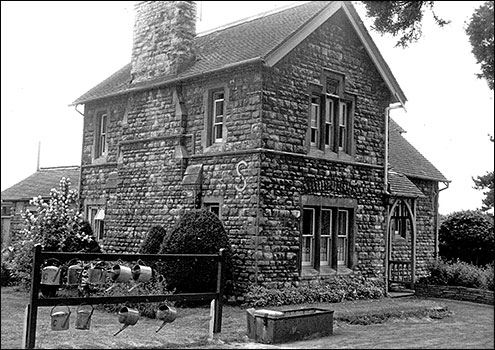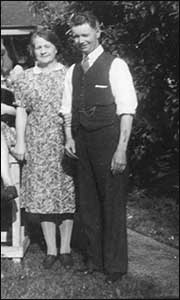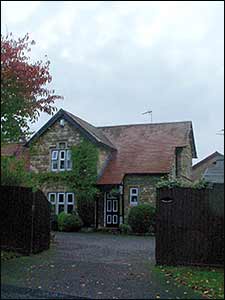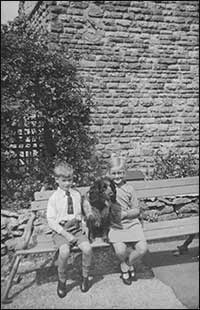|
||||||||
| Interview with Mrs. Kath Griffin in Wednesday 18th August 2010, transcribed by Sue Manton |
||||||||
|
Mrs. Kath Griffin - daughter of Reg Moisey
|
||||||||
|
"Kath would you like to tell us about your Dad."
Yes I will. Shall I start at the beginning when he first came to Rushden? His father was a Metropolitan Policeman and they lived at Hampstead and they didn’t do many years in those days so when he retired they came to Rushden as my Grandma’s parents lived in Rushden. And when my Dad came out of the Navy he came down to live with them as they bought a house at the top Harborough Road. He had always loved gardening; when he was a schoolboy he always did gardening at the school. When he came to Rushden he didn’t know what he was going to do, and first of all he worked in John White's warehouse. He worked with H.E. Bates but H.E. got the sack because he didn’t do much work as he was always doing his writing. Those days my Dad didn’t know him very well but later he did as H.E. married my Mother’s cousin. Then Dad went to work for Tom Swindall I don’t know what he did there really but anyway Tom became a great friend of his. When the vacancy came up at the cemetery, Tom said "Now this is what you want to apply for. Because you’ve always loved gardening and you’ll have as much gardening there as you could possibly want".
So he did apply and he got the job. And he was there eighteen years. His gardening skills developed and developed. Then Mr. Seckington at the shop in the High Street, a gardening shop, he became friendly with him and he suggested that he took his exams with RHS so he did and every Saturday evening he used to go down there for coaching; it went on for quite a while and I used to go with him and of course I used to get bored so I would go into the back garden and play with their little spaniel, cocker spaniel dog, Sally. That went on for months and he passed both his exams and got letters after his name for horticulture and agriculture. The cemetery in those days was full of flowers, every grave had flowers on. He used to grow them. He had a great big greenhouse in the paddock behind our back garden. He would grow the flowers and people who were coming from away would say “Would you look after our grave for us?” And it developed and he used to do a tremendous lot, setting out graves and people would come to the door when they had been away and thanked him and say "how much is it" and all that. There was one lady that used to come and her parents were the owners of the Rushden Sanatorium and they called her “Baby”, “Baby Brown”. She was quite a big lady and we used to love it when she came because she always used to leave a big bar of Cadbury’s Chocolate on the front door knob. She used to put a bit of string round it and hang it on the front door knob. We used to say “Oh Baby’s been.” Really we had the time of our lives living there. There was so much room. Dad developed all of his gardening skills through Mr. Seckington. They had two daughters May & Vi, I think that was Violet. Course they would be flower names wouldn’t they? May died but Vi will be a hundred years old in October. When my friend goes to visit her tells her things and she always says "I do remember Kathy coming and playing with the dog".
But it was lovely exciting life living there because we had so much room. In the evenings when it was closed we learnt to ride our bikes up and down the paths. I do remember Mr. Seckington. He was a lovely man; he had a very high voice, very squeaky, when he was speaking but he really was a lovely man. He did help my Dad a lot. He probably would have passed his exams but he needed that little bit of extra help. He taught him all the Latin names for the flowers and my Dad taught my eldest brother Peter. I couldn’t have done that. But Mr. Seckington was a very helpful man. It was stone built and you had to go up a lot of steps to the shop floor. That was the door that we used to go in. There was a big slope up. He had a big garden with all sorts of flowers. There was a passage way between Timpson’s Shoe shop and Mr. Seckington’s shop and then next to that was “The Chocolate Box” I don’t know if the passageway is still there. It comes out in Rectory Road. When I was playing about I had to be careful 'cause if you were running about you could soon fall over. He had green houses and cold frames to grow different plants in. I don’t think I took much notice of what was in there. I don’t know what he grew in them. I always say that they were, well not after I got married of course, some of the happiest days of my life. There was so much to do there. “You weren’t scared with the graves and it didn’t worry you seeing funerals and things?” No. Every Sunday after Sunday School me and my younger brother John used to say “Dad can we go round the cemetery.” And he used to say "yes you can go round as long as you don’t do anything you shouldn’t". Well or course we did. When we used to go round the graves had all different coloured pebbles on and so we used to go round and pick them up and use them for “Jack Stones.” So that’s what we used to do. Also we had what I call a “trolley” a bit like a Go-cart. A lady came to the door one day and said to my Dad “I wonder if you would allow your children to have this trolley. It was beautiful, I don’t know if it was oak or pine but it was all polished. I had it made for my children but they weren’t content to play with it in the back garden they wanted to go out on the road and so I said “That’s it, its going” so will you allow your children to have it. I know they won’t do any damage but they can ride up and down the cemetery drive when it’s closed.” So my Dad said yes. It was lovely but my two brothers weren’t content and they went out on the road and so my Dad said “That’s it” and I always remember he chopped it up. That was terrible but that’s how boys are. They always have to push you a bit farther. But we had a lovely time. We could ride our bikes up and down the drive and there was a kind of freedom. We also had such a big paddock out the back but that went when the war came because “Selwood’s” factory was at the bottom there and the air force took that over so they also took over our paddock and my Dad’s greenhouse went. It was ever such a big greenhouse. It was a shame really but that’s how the war was. You had to do as you were told. We had the rec at the side and so we had plenty of play ground. It was a lovely life really. “And what did your Mother do? Did she just stay at home?” She just stayed at home. She would say she hadn’t got time for anything else as she was always answering the front door. We had some funny things happen really. It was nothing for someone to come to the front door. Mum put in a complaint about it because she didn’t think it was fair on the children to have a baby’s coffin thrust in her arms. They had to be buried and they didn’t seem to realise that children didn’t want to see that kind of thing and so she put in a complaint and they did stop doing that. There was a place where they could take them round the back, what we called “The Men’s Barn” where the men used to congregate. There were five men used to work there besides my Dad. Now there’s one. Then my Dad had all the worry of the wartime. They sent him on a course to Leicester to deal with the mortuary. It was terrible really. He didn’t want to do it but he had to. I shall never forget when Alfred Street School was bombed. This man came to the door and said “I’m looking for my son and I’ve looked everywhere else and this is the last place.” My Dad heard him and came to the door. The man said “He has irons on his legs.” My Dad said “Yes he’s here.” My Dad never had anything to eat for two weeks as he had to deal with all the bodies. It really wasn’t what he wanted to do but what could he do. If you were there and they said you had to do it you just had to get on with it but he never really like doing it. Flowers were what he really wanted to do. “That is really interesting. Now what about when you were a dinner lady at Newton Road School. How long were you a dinner lady and when did you start?” I was a dinner lady for 20 years. I retired 14 years ago and so that would be round about 1977 when it was the Queen’s Jubilee. Mr. Dyment was the headmaster then. He was lovely. Then there was Mr. Robinson and then Mr. Harper. “So did they still have hot dinners then or was it packed lunches.” No we used to go down to the Canteen in Portland Road. We used to march down there every day. There were about fifty children and two dinner ladies. There was me and Doreen Evans. She’s died now. But we enjoyed every minute of it. I’d go back if I had the chance because I so enjoyed being with the children. We joined in with their games and we used to teach them different games that they’d never heard of. There was one called “Sheep, sheep come over.” I would stand in the middle. I was really the wolf. I would say “Sheep, sheep come over.” They would say “Afraid, afraid.” Then I would say “The wolf’s gone to Devonshire and won’t be back for seven year.” Then of course they would come and you would chase them. They loved that. Then of course we did “Ring-a-Roses”. We did Hop-scotch. I could do that then but I can’t do it anymore. I tried it but I can’t. Most of the games were where you were chasing them and that caused a bit of excitement. When the winter came and we had the snow, well that was lovely. It’s gone ridiculous what they can do in the playground now. Then we used to have snowball fights and I would roll them in the snow and all that kind of thing and they loved it. But now you’re not allowed to touch them. If the boys had fights I used to wade in and Mr. Dyment said “I’m going to make you ‘Woman of the Year’ how you tackle them.” I used to wade in and hit them with my handbag and part them and that was the end of the fight. But now you can’t even put your hand on their shoulder. It’s sad really. I remember different things. I said when I left that I would write a book but I’ve not got round to it yet. I loved every minute of it. We used to march down to Portland Road. The canteen was opposite where the shop was at the bottom of King’s Road. We would take it in turns. I would be walking round and watching them in the queue while Doreen would be having her lunch at one of the tables and we would take it in alternate turns. They would say “Don’t you eat your dinner quick?” I would say “Well it’s a case of having to as I have to get up and look after you lot.” So we had a free dinner but that went after a little while. We were supposed to have money instead and we got about a penny extra. I didn’t mind. Some of the dinners were all right but some of them weren’t up to much. “Later on did it go to packed lunches?” Yes it did. They made a dining room out of the old bicycle shed I think it was. We used to do that in turns. They brought the meals up in a van and so Doreen would be in with them while they had their hot meal. Then Doreen would come out to the playground with them and I would go in with the packed lunches. Mr. Dyment would come in and have a hot lunch but he would eat it very quick and then he would go and the hullabaloo would start. There was one teacher that used to come - Mr. Whitworth I think it was - and he never spoke and never did anything but as soon as he came in through that door it ceased and it became silent. We always used it say “It’s magic how he does that.” Just his presence was enough to keep them quiet. I know one day Mr. Dyment didn’t come in and he always used to say grace. He didn’t come in and so I had to do it. I stood there and I said “I’m waiting” because they were all shouting about. “I’m waiting for grace.” This kid shouted out “Well Grace isn’t coming today and so we might as well get on with it.” I can remember all those sort of things and laugh about it. There were some rough ones of course because we were in the area where there were some rough ones like. But I enjoyed it anyway. I had a lovely brooch given to me when I left. I don’t know if was diamond or not but it came from Percy House’s and a nice cut glass vase. |
||||||||
|
|
||||||||
|
|



